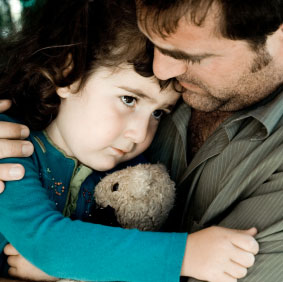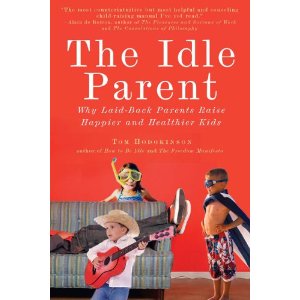Today’s guest post is by Esther Boykin, a licensed marriage and family therapist and the co-owner of Group Therapy Associates. I thought it was an appropriate post because many people ask me how far they should go in hiding their depression from their kids.
 A friend of mine recently called me to settle a debate between her and her husband. In the matter of a week her husband was let go from his job and their daughter learned that she had not been accepted to a prestigious private school to which she had recently applied. My friend felt that this was a serendipitous opportunity to share with the daughter that disappointment and unexpected bad news is part of life, even when we work hard. In her view, since the family was not in any financial danger and in fact her husband was likely to accept a new business opportunity even better than the job he lost, this was an excellent opportunity to share his experience with their child. The husband strongly disagreed, believing that it was their duty to protect their children from unnecessary worry.
A friend of mine recently called me to settle a debate between her and her husband. In the matter of a week her husband was let go from his job and their daughter learned that she had not been accepted to a prestigious private school to which she had recently applied. My friend felt that this was a serendipitous opportunity to share with the daughter that disappointment and unexpected bad news is part of life, even when we work hard. In her view, since the family was not in any financial danger and in fact her husband was likely to accept a new business opportunity even better than the job he lost, this was an excellent opportunity to share his experience with their child. The husband strongly disagreed, believing that it was their duty to protect their children from unnecessary worry.
My friend wanted to use their real-life example as a way to teach their daughter about facing life’s challenges and finding the opportunity for growth when things go wrong. Her husband wanted to spare their teenage daughter the burden of worrying about adult responsibilities. While I did not have a good answer for them; it did get me thinking. When is it ok to let our children see us fail?
For many of us growing up we were told to keep out of grown folks business or mind our manners when asking too many questions. We learned that there is a separation between adult life and children’s life. This boundary between what adults do and say is a necessary and appropriate part of parenting. Children need to be children, free from the responsibility and stress that comes with adulthood. Allowing our children to share our adult baggage, even just by talking with them about it, is not only unfair but can be detrimental to their own emotional and social development. Yet it is equally unhelpful to completely shield them from the realities of life and the valuable lessons that can be learned by having them watch how you effectively deal with them.
I firmly believe that as parents we have an obligation to our children to give them a model by which to live their life; not just rules and instructions. Children learn most of what they take into adulthood by watching our example, not by simply following our directions. Unfortunately, our children often only see bits and pieces of how we handle life. Children see the end result of a parent’s paycheck but rarely get a sense of the hard work and personal sacrifice that went into getting to that financial reward. In the same way, children often see parental conflicts begin but rarely do they witness parents (or other family members) during the making up process. This one-sided view of relationships and life is common in many families and across many circumstances and little thought is given to the impact. But, if we never let them see us face challenges and setbacks, how will they learn to persevere and manage their own disappointments?
The balance between disclosing our failures, faults, and struggles with our children and protecting them from those stressors is a tricky thing. The line is constantly moving between what is appropriate and helpful and what information is too much. As parents we have such an amazing opportunity to truly shape our children into resilient and compassionate adults. Part of helping them get there is letting them see us stumble along the way sometimes. In our moments of honesty with them, we are able to show our children that even in adulthood there will be challenges, but part of growing up is learning to face them with grace and courage.

Esther Boykin is a licensed Marriage and Family Therapist and the co-owner of Group Therapy Associates, a private practice in Northern Virginia. In addition, she is a freelance writer and regular contributor to many online publications, including a weekly column for I Am Modern and monthly features at Hitched.com. Her areas of special interest include couple dynamics, teenagers, and the impact of trauma on intimate relationships. Find more of her writing on her blog at http://blog.grouptherapyassociates.org and learn more about her clinical work or schedule an appointment at www.grouptherapyassociates.org.

